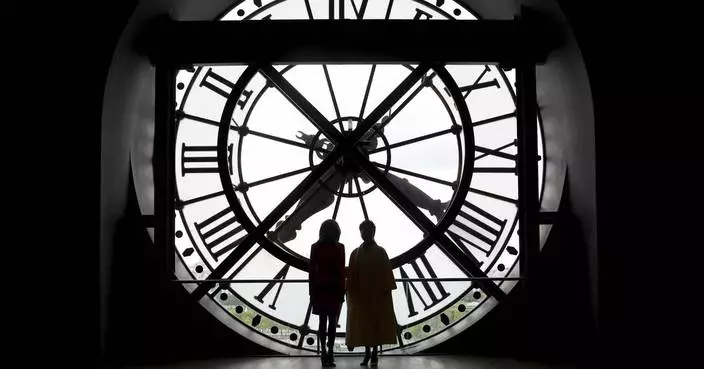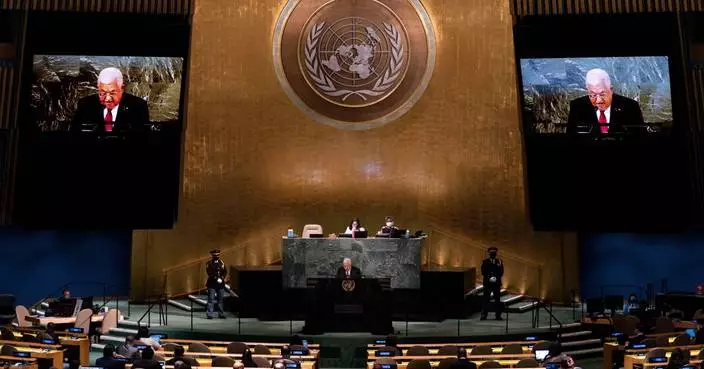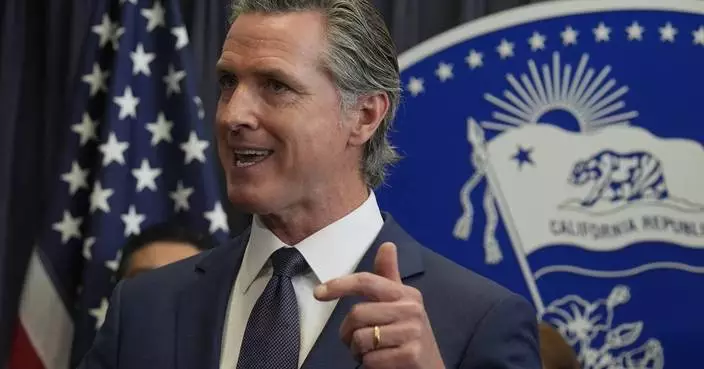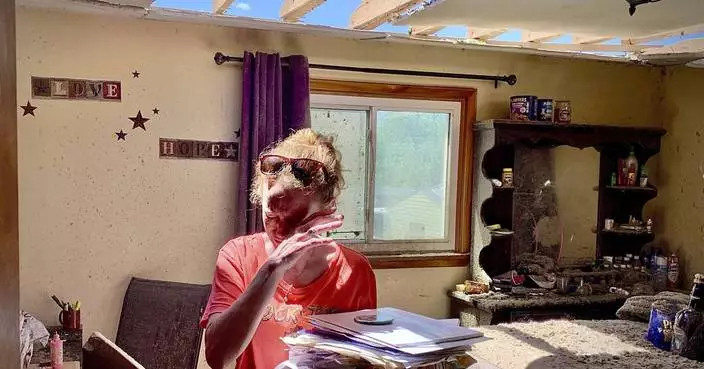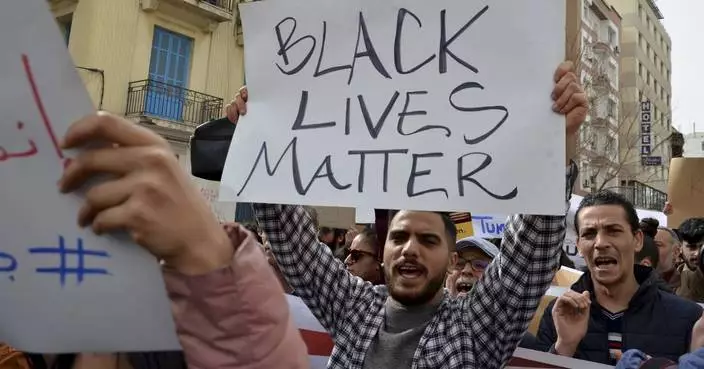As NATO allies convene, one issue not on their formal agenda but never far from their thoughts is immigration — even though illegal border crossings are decreasing on both sides of the Atlantic.
The separation of families at the U.S.-Mexico border and Italy's refusal to let shipwrecked migrants disembark in its ports illustrate the hardening positions on border control in Washington and European capitals.
Click to Gallery
As NATO allies convene, one issue not on their formal agenda but never far from their thoughts is immigration — even though illegal border crossings are decreasing on both sides of the Atlantic.
Lost in the heated political debate is the fact that migrant arrivals in Europe across the Mediterranean from Africa and Turkey are at their lowest level in five years, while arrests on the U.S.-Mexico border — an imperfect but widely used gauge of illegal crossings — are far below levels seen two decades ago.
In both the U.S. and Europe, immigration is increasingly a key political fault line. One side accuses those cracking down on illegal immigration of scapegoating immigrants for problems such as crime and unemployment, even when the correlation is weak. The other side says politicians are simply recognizing voters' concerns about national identity and poor integration that have long been ignored.
In Europe, the liberal immigration policies that many governments implemented until recently never had widespread popular support, said Ivar Arpi, a conservative editorial writer at Swedish newspaper Svenska Dagbladet. But because Europeans cared more about other issues, such as the economy or education, there was no serious backlash.
Immigration is a major theme ahead of Sweden's elections in September, just as it has been in a series of European votes in the past two years, including Britain's referendum on leaving the EU. Far-right and anti-migrant parties have made gains in Austria, France and Germany, while Hungary's Prime Minister Viktor Orban, known for his tough stance on migrants, easily won re-election in April.
Just weeks after taking office in Italy's coalition government, the League — a party vowing to put "Italians first" — has forced other EU nations to grapple with the issue of sea arrivals, which have placed a disproportionate burden on Mediterranean countries in dealing with those seeking a new life in Europe. Things came to a head when League leader Matteo Salvini, Italy's interior minister and deputy prime minister, closed Italian ports to private ships picking up migrants sailing from North Africa in flimsy boats, saying those volunteer rescuers act as de facto "taxi services" for human smuggling networks. As a result, two rescue vessels have had to carry rescued migrants on a much longer journey to Spain, and another spent days in limbo off Malta until European countries agreed to share the responsibility for the more than 200 people on board.
Even German Chancellor Angela Merkel, who refused to close Germany's borders at the height of the migrant crisis in 2015, has toughened her stance. To salvage her government from a rift over migration, she has agreed to set up transit centers to process migrants and potentially turn them away at the Austrian border. German police recorded fewer than 5,000 illegal crossings of that border in January-May, compared with more than 60,000 in the same period in 2016.
In the U.S., President Donald Trump has made immigration a big issue, with his "zero tolerance" policy to criminally prosecute anyone caught crossing the border illegally. Because children can't be in jail with their parents, more than 2,300 families caught by Border Patrol were separated, generating outrage in the U.S. and abroad. The move has drawn condemnation from religious, humanitarian and political leaders.
The Pew Research Center, which studies migration trends in the U.S., determined in 2014 that more Mexican immigrants are leaving the U.S. than arriving, which is part of the reason for the slowing rates. The collapse of the housing market a decade ago also contributed as the U.S. economy tanked and jobs dried up.
Charles Hirschman, a professor at the University of Washington in Seattle who has researched immigration in the U.S., said the popular and political response to immigration is only "loosely connected" to the volume of arrivals. Economic insecurity among workers and "unscrupulous political leaders" who use fear of migrants to mobilize followers, are much more important factors, he said.
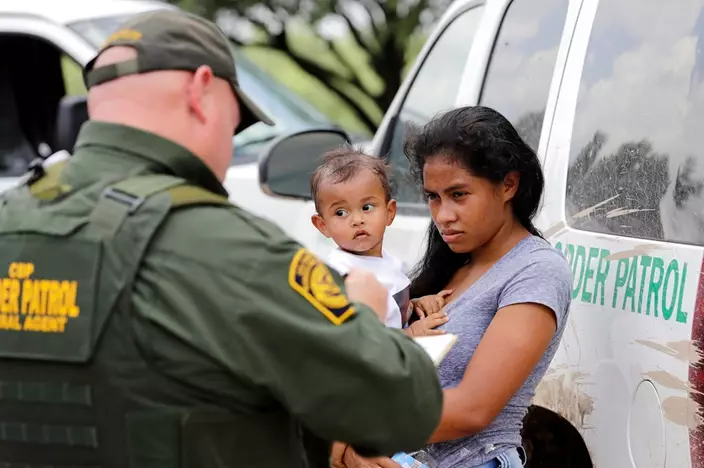
FILE - In this Monday, June 25, 2018 file photo, a mother migrating from Honduras holds her 1-year-old child as surrendering to U.S. Border Patrol agents after illegally crossing the border, near McAllen, Texas. As NATO allies convene, one issue not on their formal agenda but never far from their thoughts is immigration, even though illegal border crossings are decreasing on both sides of the Atlantic. The separation of families at the U.S.-Mexico border and Italy’s refusal to let shipwrecked migrants disembark in its ports illustrate the hardening positions on border control in Washington and European capitals. (AP Photo/David J. Phillip, File)
Lost in the heated political debate is the fact that migrant arrivals in Europe across the Mediterranean from Africa and Turkey are at their lowest level in five years, while arrests on the U.S.-Mexico border — an imperfect but widely used gauge of illegal crossings — are far below levels seen two decades ago.
"The numbers don't support the hysteria," said Joel Millman, a spokesman for the Geneva, Switzerland-based International Organization for Migration. "Politicians know what moves voters, and this is extremely effective in moving voters."
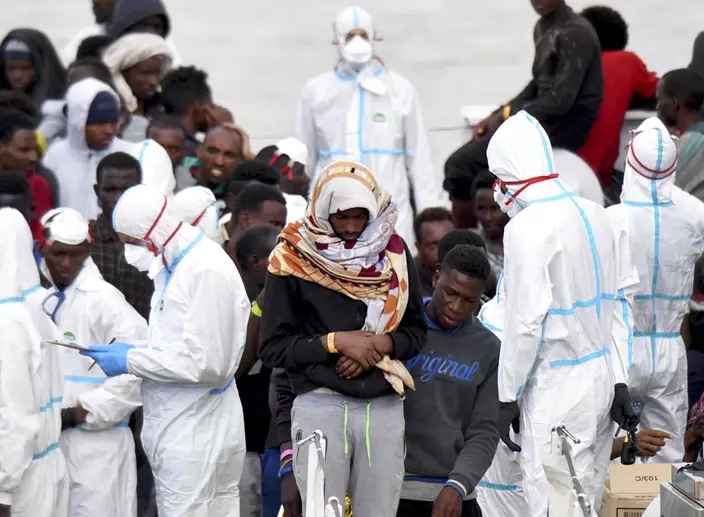
FILE - In this Wednesday, June 13, 2018 file photo, migrants wait to disembark from Italian Coast Guard vessell "Diciotti" as it docks at the Sicilian port of Catania, southern Italy. As NATO allies convene, one issue not on their formal agenda but never far from their thoughts is immigration, even though illegal border crossings are decreasing on both sides of the Atlantic. The separation of families at the U.S.-Mexico border and Italy’s refusal to let shipwrecked migrants disembark in its ports illustrate the hardening positions on border control in Washington and European capitals. (AP Photo/Salvatore Cavalli, File)
In both the U.S. and Europe, immigration is increasingly a key political fault line. One side accuses those cracking down on illegal immigration of scapegoating immigrants for problems such as crime and unemployment, even when the correlation is weak. The other side says politicians are simply recognizing voters' concerns about national identity and poor integration that have long been ignored.
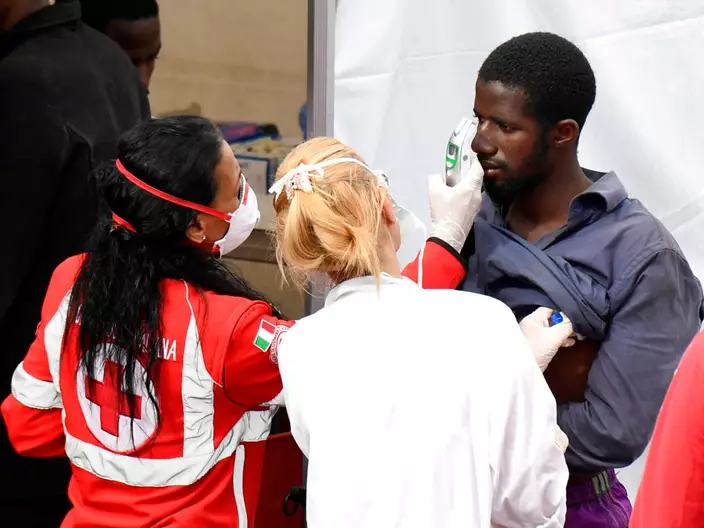
FILE - In this Wednesday, June 13, 2018 file photo, a migrant has a health check up after disembarking from Italian Coast Guard vessell "Diciotti", docked at the Sicilian port of Catania, southern Italy. As NATO allies convene, one issue not on their formal agenda but never far from their thoughts is immigration, even though illegal border crossings are decreasing on both sides of the Atlantic. The separation of families at the U.S.-Mexico border and Italy’s refusal to let shipwrecked migrants disembark in its ports illustrate the hardening positions on border control in Washington and European capitals. (AP Photo/Salvatore Cavalli, File)
In Europe, the liberal immigration policies that many governments implemented until recently never had widespread popular support, said Ivar Arpi, a conservative editorial writer at Swedish newspaper Svenska Dagbladet. But because Europeans cared more about other issues, such as the economy or education, there was no serious backlash.
That changed in 2015, when 1 million people — most of them from Syria, Iraq and Afghanistan — crossed into Europe from Turkey and used the lack of border controls in the European Union to roam freely from the Balkans into Austria and onward to Germany and Scandinavia. That surge and the pressures it put on the destination countries pushed migration to the top of Europe's political agenda, where it has remained since.
"2015 fundamentally changed Europe. But it is hard to know how big a change is when you still are in the middle of it," Arpi said. "Nationalism or globalism, this is the new divide between people. It trumps left-right."
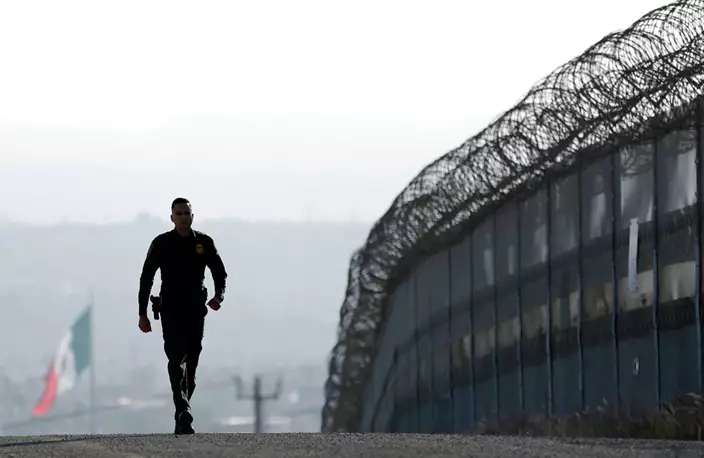
FILE - In this June 22, 2016, file photo, Border Patrol agent Eduardo Olmos walks near the secondary fence separating Tijuana, Mexico, background, and San Diego in San Diego. As NATO allies convene, one issue not on their formal agenda but never far from their thoughts is immigration, even though illegal border crossings are decreasing on both sides of the Atlantic. The separation of families at the U.S.-Mexico border and Italy’s refusal to let shipwrecked migrants disembark in its ports illustrate the hardening positions on border control in Washington and European capitals. (AP Photo/Gregory Bull, File)
Immigration is a major theme ahead of Sweden's elections in September, just as it has been in a series of European votes in the past two years, including Britain's referendum on leaving the EU. Far-right and anti-migrant parties have made gains in Austria, France and Germany, while Hungary's Prime Minister Viktor Orban, known for his tough stance on migrants, easily won re-election in April.

FILE - In this Wednesday, June 13, 2018 file photo, a migrant has a health check up after disembarking from Italian Coast Guard vessell "Diciotti", docked at the Sicilian port of Catania, southern Italy. As NATO allies convene, one issue not on their formal agenda but never far from their thoughts is immigration, even though illegal border crossings are decreasing on both sides of the Atlantic. The separation of families at the U.S.-Mexico border and Italy’s refusal to let shipwrecked migrants disembark in its ports illustrate the hardening positions on border control in Washington and European capitals. (AP Photo/Salvatore Cavalli, File)
Just weeks after taking office in Italy's coalition government, the League — a party vowing to put "Italians first" — has forced other EU nations to grapple with the issue of sea arrivals, which have placed a disproportionate burden on Mediterranean countries in dealing with those seeking a new life in Europe. Things came to a head when League leader Matteo Salvini, Italy's interior minister and deputy prime minister, closed Italian ports to private ships picking up migrants sailing from North Africa in flimsy boats, saying those volunteer rescuers act as de facto "taxi services" for human smuggling networks. As a result, two rescue vessels have had to carry rescued migrants on a much longer journey to Spain, and another spent days in limbo off Malta until European countries agreed to share the responsibility for the more than 200 people on board.
The crackdown comes as the number of those trying to make the perilous crossing is dwindling. Sea arrivals in Italy were already down by 80 percent when the new government took office. Across the Mediterranean, about 45,000 migrants arrived by sea in Italy, Greece and Spain in the first half of the year, according to the U.N. refugee agency. That's the lowest level since 2013 and down from about 100,000 in the same period last year. So far this year, 1,400 migrants are believed to have died trying to cross the Mediterranean.
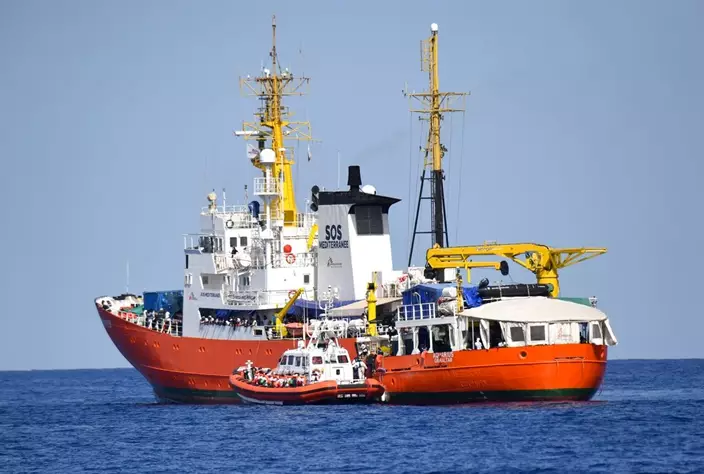
FILE - In this June 12, 2018 file photo, an Italian Coast Guard boat approaches the French NGO "SOS Mediterranee" Aquarius ship as migrants are being transferred, in the Mediterranean Sea. As NATO allies convene, one issue not on their formal agenda but never far from their thoughts is immigration, even though illegal border crossings are decreasing on both sides of the Atlantic. The separation of families at the U.S.-Mexico border and Italy’s refusal to let shipwrecked migrants disembark in its ports illustrate the hardening positions on border control in Washington and European capitals. (AP Photo/Salvatore Cavalli, File)
Even German Chancellor Angela Merkel, who refused to close Germany's borders at the height of the migrant crisis in 2015, has toughened her stance. To salvage her government from a rift over migration, she has agreed to set up transit centers to process migrants and potentially turn them away at the Austrian border. German police recorded fewer than 5,000 illegal crossings of that border in January-May, compared with more than 60,000 in the same period in 2016.
Guy Verhofstadt, a former Belgian prime minister and current president of an alliance of liberals in the European Parliament, last week ridiculed concerns over what he referred to as a "so-called" crisis.
"Why I am saying so-called? Because I don't think it is a real migration crisis what we are living in Europe for the moment," he told the assembly, noting that the flow is a tiny fraction of the 68 million displaced people worldwide, according to U.N. figures.

In this photo taken on Sunday, June 17, 2018 and provided by U.S. Customs and Border Protection, people who've been taken into custody related to cases of illegal entry into the United States, rest in one of the cages at a facility in McAllen, Texas. As NATO allies convene, one issue not on their formal agenda but never far from their thoughts is immigration, even though illegal border crossings are decreasing on both sides of the Atlantic. The separation of families at the U.S.-Mexico border and Italy’s refusal to let shipwrecked migrants disembark in its ports illustrate the hardening positions on border control in Washington and European capitals. (U.S. Customs and Border Protection's Rio Grande Valley Sector via AP)
In the U.S., President Donald Trump has made immigration a big issue, with his "zero tolerance" policy to criminally prosecute anyone caught crossing the border illegally. Because children can't be in jail with their parents, more than 2,300 families caught by Border Patrol were separated, generating outrage in the U.S. and abroad. The move has drawn condemnation from religious, humanitarian and political leaders.
The U.S. Border Patrol made about 304,000 arrests on the U.S.-Mexico border in 2017, compared with the record high of 1.64 million in 2000. The highest number this decade was 447,000 in 2010, which is still dramatically lower than what the U.S. experienced in the 1990s and 2000s when the Border Patrol routinely exceeded more than 1 million arrests of immigrants at the Mexico border.
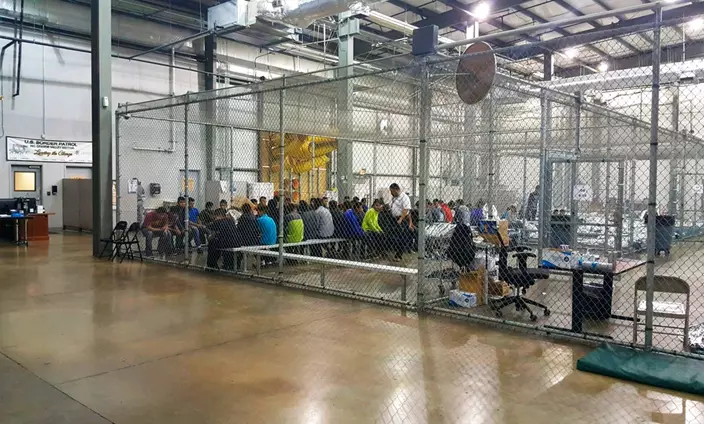
In this photo taken on Sunday, June 17, 2018 provided by U.S. Customs and Border Protection, people who've been taken into custody related to cases of illegal entry into the United States, sit in one of the cages at a facility in McAllen, Texas. As NATO allies convene, one issue not on their formal agenda but never far from their thoughts is immigration, even though illegal border crossings are decreasing on both sides of the Atlantic. The separation of families at the U.S.-Mexico border and Italy’s refusal to let shipwrecked migrants disembark in its ports illustrate the hardening positions on border control in Washington and European capitals. (U.S. Customs and Border Protection's Rio Grande Valley Sector via AP)
The Pew Research Center, which studies migration trends in the U.S., determined in 2014 that more Mexican immigrants are leaving the U.S. than arriving, which is part of the reason for the slowing rates. The collapse of the housing market a decade ago also contributed as the U.S. economy tanked and jobs dried up.
But one element of immigration into the U.S. that has surged significantly in recent years is the arrival of children who travel without their parents from Central America. In 2010, the U.S. had about 18,000 unaccompanied children taken into custody at its borders, increasing to 68,000 four years later and remaining above 40,000 each year since.
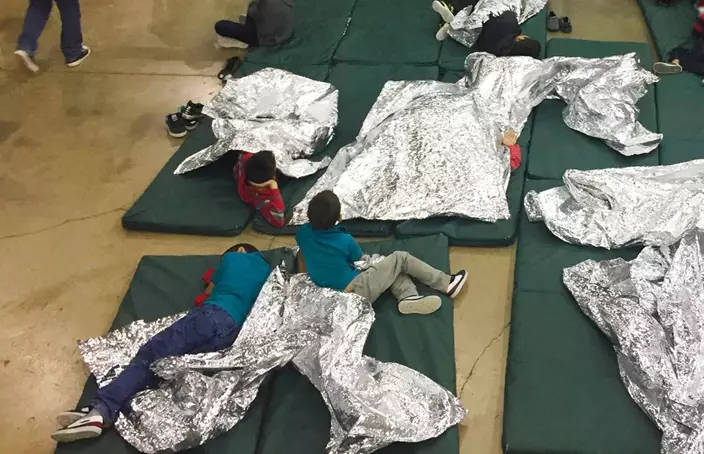
In this photo taken on Sunday, June 17, 2018 and provided by U.S. Customs and Border Protection, people who've been taken into custody related to cases of illegal entry into the United States, rest in one of the cages at a facility in McAllen, Texas. As NATO allies convene, one issue not on their formal agenda but never far from their thoughts is immigration, even though illegal border crossings are decreasing on both sides of the Atlantic. The separation of families at the U.S.-Mexico border and Italy’s refusal to let shipwrecked migrants disembark in its ports illustrate the hardening positions on border control in Washington and European capitals. (U.S. Customs and Border Protection's Rio Grande Valley Sector via AP)
Charles Hirschman, a professor at the University of Washington in Seattle who has researched immigration in the U.S., said the popular and political response to immigration is only "loosely connected" to the volume of arrivals. Economic insecurity among workers and "unscrupulous political leaders" who use fear of migrants to mobilize followers, are much more important factors, he said.
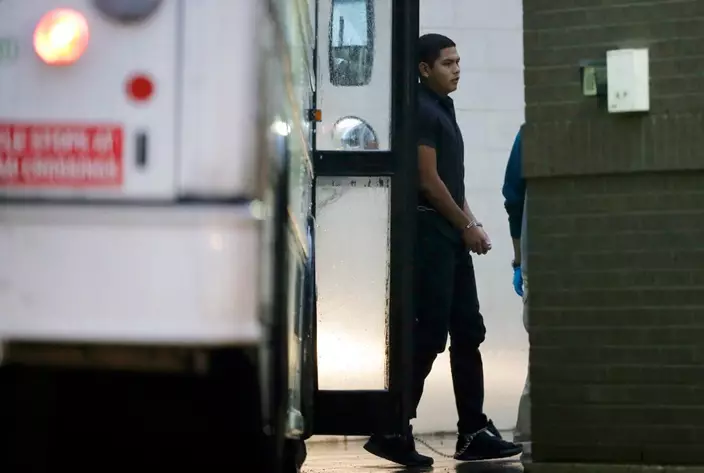
FILE - In this Thursday, June 21, 2018 file photo, immigrants in handcuffs and ankle chains arrive at the Federal Courthouse for hearings, in McAllen, Texas. As NATO allies convene, one issue not on their formal agenda but never far from their thoughts is immigration, even though illegal border crossings are decreasing on both sides of the Atlantic. The separation of families at the U.S.-Mexico border and Italy’s refusal to let shipwrecked migrants disembark in its ports illustrate the hardening positions on border control in Washington and European capitals. (AP Photo/Eric Gay, File)
"Political leaders who try to hew to a more balanced perceptive are usually at a political disadvantage," he said in a reference to Merkel. "Fear is a very potent political weapon."
DUMA, West Bank (AP) — Charred homes and cars dotting this hilltop village surrounded by olive groves are a searing reminder of Palestinians' vulnerability to rising violence from Israeli settlers.
The trail of wreckage along Duma's main road is the aftermath of a three-hour attack in mid-April that left 15 homes damaged by arson and six residents injured by bullets, the head of its village council said. It was one of nearly 800 settler attacks against Palestinians in the occupied West Bank since Hamas attacked Israel from the Gaza Strip on Oct. 7, according to the U.N.
The burnt remains in Duma also highlight the village's limited resources to clean up and rebuild, let alone defend itself from future incursions, which seem inevitable as gun-toting settlers patrol the area roughly 20 miles (30 kilometers) north of Jerusalem.
“We as the village of Duma ... do not have the power to defend ourselves,” said Suleiman Dawabsha, chairman of the village council for this community of more than 2,000 people. He estimated the attack caused five million shekels ($1.3 million) in damage.
The rampage on April 13 echoed a similar event that took place almost a decade ago. In 2015, three Palestinians from Duma were killed, including an 18 month-old baby, after settlers fire-bombed a home there. An Israeli man was later convicted for murder.
The latest attack against Duma was part of a wave of settler violence touched off by the death of a 14-year-old Israeli who went missing on the morning of April 12. Authorities found his body the next day and they have arrested a man from Duma who they say was connected to the boy's alleged murder.
On April 15, two days after the attack in Duma, two Palestinians were shot dead by settlers near the town of Aqraba, according to the Palestinian Health Ministry. And in a related spurt of violence, a man was killed by Israeli fire on April 12 in nearby al-Mughayyir, though it remains unclear whether the fatal bullet was fired by a soldier or settler.
There have been 794 settler attacks against Palestinians in the West Bank since Oct. 7 — from stones thrown at passing cars to bullets fired at residents, according to the United Nations Office for the Coordination of Humanitarian Affairs. At least 10 Palestinians have been killed by settlers in these attacks, it said.
Attacks by settlers aren't the only form of violence on the rise in the West Bank.
Since the war in Gaza began, nearly 500 Palestinians have been killed by Israeli fire in the territory, according to the Health Ministry based in Ramallah, which says the overwhelming majority have been shot dead by soldiers. Palestinians in the West Bank have killed nine Israelis, including five soldiers, since Oct. 7, according to U.N. data.
The war has undoubtedly heightened tensions between settlers and Palestinians. But Israeli human rights groups blame the far-right government of Prime Minister Benjamin Netanyahu for fueling settler violence by promoting an ideology of total Israeli supremacy in the West Bank.
These groups say the Israeli army doesn't do enough to stop the violence, and even facilitates it in some cases by offering the settlers protection. The Israeli army said in a statement it tries to protect everyone living in the West Bank and that complaints about soldiers are investigated.
No one was killed in the attack on Duma, but residents described narrow escapes.
Ibrahim Dawabsha, a truck driver and father of four, said most of his family hid in the kitchen as settlers launched firebombs and set part of their home ablaze.
“My daughter was at her uncle’s house, there was no one there,” he said. “What they (might) do to her I don’t know.”
The heads of Duma and al-Mughayyir said Israeli troops arrived shortly after the attacks on their communities began but did little to intervene. Instead, they fired at Palestinians attempting to confront the settlers, these officials said.
A prominent Israeli human rights group, Yesh Din, described it as an “umbrella of security” — a collaboration it says has become increasingly common since Israel's right-wing coalition government came to power in late 2022.
“As soon as the Palestinians try to protect themselves, they’re the ones who the army attacks,” said Ziv Stahl, Yesh Din’s director.
The United States has increased pressure on Israel to curb settler attacks in the West Bank, sanctioning some leaders, including a close ally of Israel's far-right national security minister, Itamar Ben-Gvir.
Dawabsha, the chief of Duma, does not believe the pressure campaign will be effective. “I am not pinning my hopes on the American government,” he said.
Israel captured the West Bank, east Jerusalem and Gaza in the 1967 Mideast war, territories Palestinians want as part of a future state. Settlers claim the West Bank, home to some 3 million Palestinians, is their biblical birthright.
Around 500,000 Israeli settlers live across hundreds of settlements and outposts in the West Bank. These segregated and tightly guarded communities vary in size and nature. Larger settlements are akin to Jerusalem’s sprawling suburbs, while smaller unauthorized outposts can consist of just a few caravans parked on a hilltop.
Outposts often receive tacit government support and sometimes they gain formal recognition — and receive funding — from the Israeli government.
Duma's geography makes it uniquely vulnerable to attack.
Overlooking Jordan and Israeli settlements to the east, the village is surrounded more closely by at least three outposts that the head of its council says have expanded gradually over the past decade. Duma is in a section of the West Bank known as Area B: Its civil affairs are governed by the Palestinian Authority, but the Israeli military is in charge of its security.
Palestinians largely consider the PA to be ineffective and corrupt, and it rarely opposes Israel's military operations in the territory.
Over the past year, settlers have cut off Duma's access to four vital springs and wells that surround the village by sabotaging roads and other infrastructure, according to residents.
In the days following Hamas' Oct. 7 attack on southern Israel, more than 100 Bedouin Arabs that were living a nomadic lifestyle in the pastures south of Duma relocated to its fringes in search of greater safety and resources.
One of them, Ali Zawahiri, said his extended family relocated after settlers had begun burning their tents and stealing their livestock in apparent revenge attacks. The Bedouin Arabs living near Duma are one of 16 such communities in the West Bank that have relocated because of settler violence or threats since the start of 2023, according to Yesh Din.
"He is armed with a gun and I am just a person with nothing,” Zawahiri said.
An armed unit run by the Palestinian Authority that formerly patrolled the perimeter of West Bank towns at night halted operations shortly after the Gaza war broke out, when members of the force were kidnapped by settlers.
When asked how they might better defend themselves in the future, residents of Duma struggled to answer.
“What preparations?" said Ibrahim Dawabsha, whose truck — his main source of income — was burnt to ashes. "There are no preparations.”
Associated Press video journalist Imad Isseid contributed to this report.
This story has been corrected to show that some 3 million Palestinians live in the West Bank. An earlier version said there were 2,000.
Follow AP's coverage at https://apnews.com/hub/israel-hamas-war
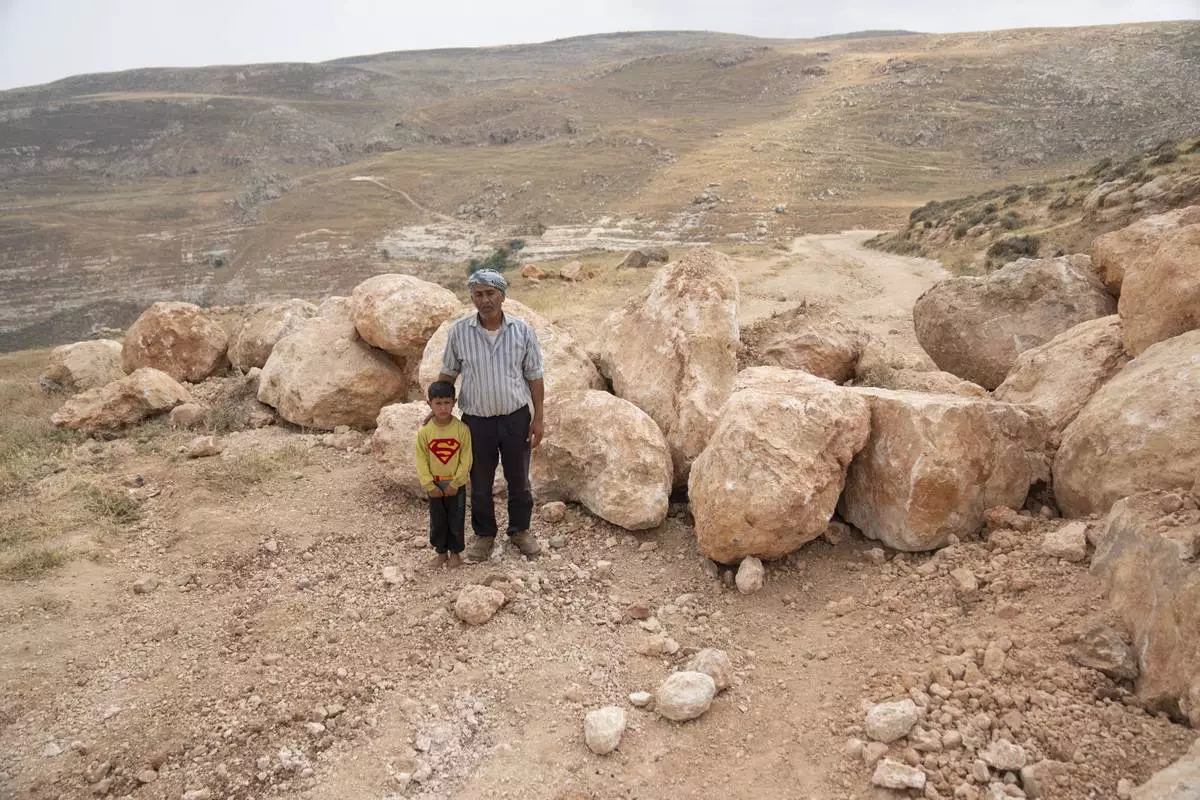
Bedouin Khaled Arara, 54, and his son Ali, 7, pose for a picture on the road leading to his hamlet that was closed with rocks by Israeli settlers, Tuesday, April 30, 2024. (AP Photo/Nasser Nasser)

A Bedouin man attends his herd after he fled his home following a wave of attacks by Israeli settlers, Tuesday, April 30, 2024. (AP Photo/Nasser Nasser)

An Israeli settlers' outpost on a hilltop, right, is seen from outskirts of the West Bank town of Duma, Tuesday, April 30, 2024. (AP Photo/Nasser Nasser)

Bedouins fled their homes on the far hillside seen in the background following a wave of attacks by Israeli settlers, Tuesday, April 30, 2024. (AP Photo/Nasser Nasser)
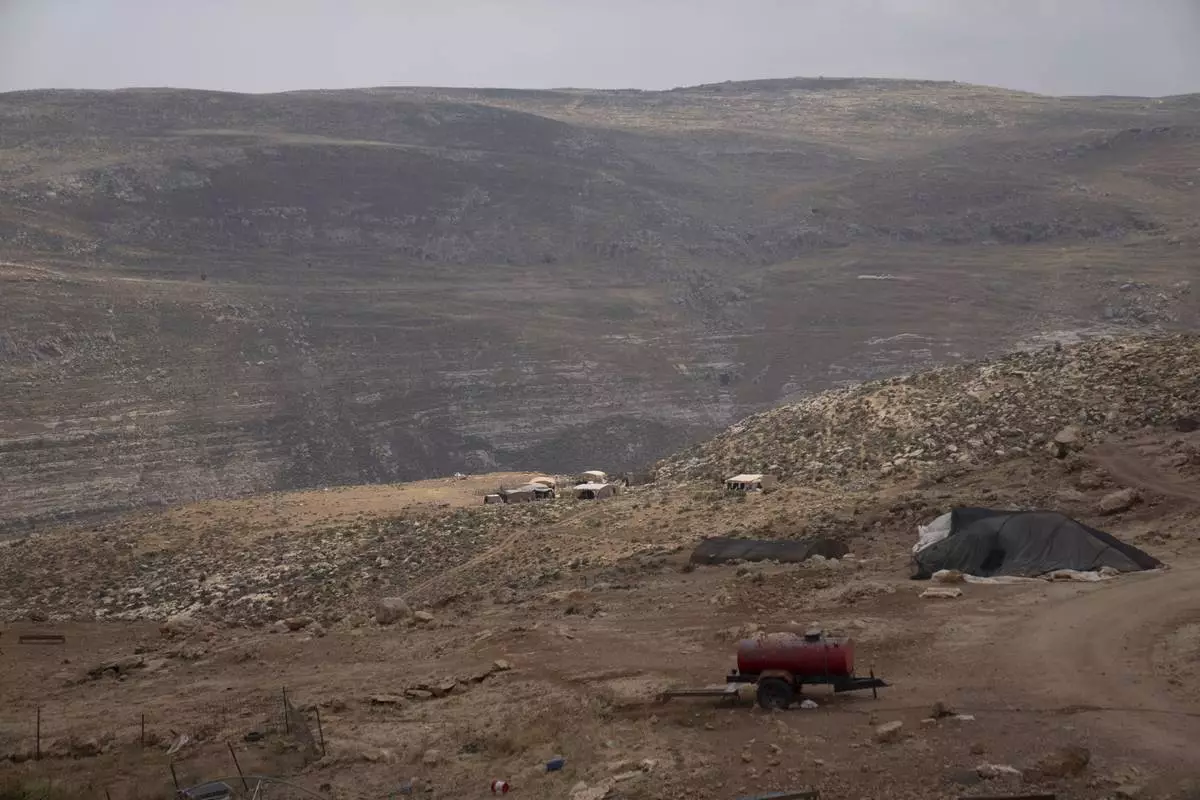
Bedouins fled their homes on the far hillside seen in the background following a wave of attacks by Israeli settlers, Tuesday, April 30, 2024. (AP Photo/Nasser Nasser)
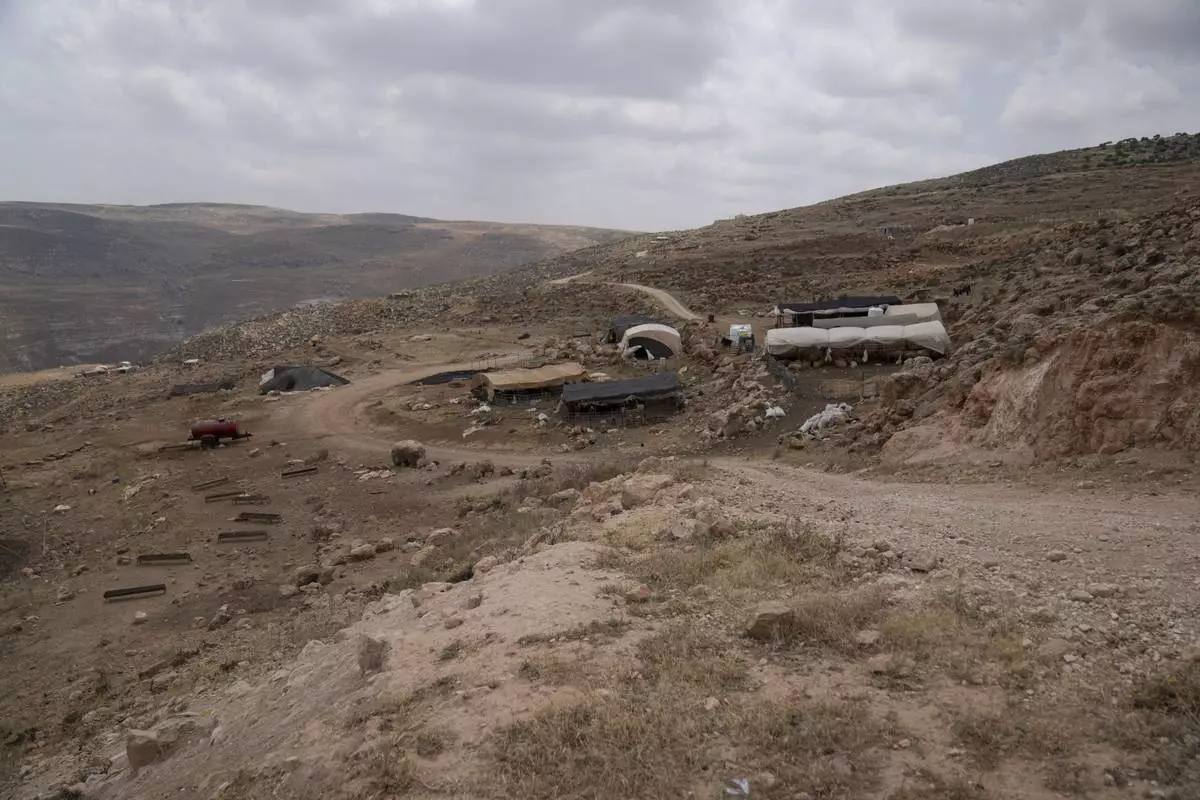
A Bedouin man fled his home on the far hillside seen in the background following a wave of attacks by Israeli settlers, Tuesday, April 30, 2024. (AP Photo/Nasser Nasser)
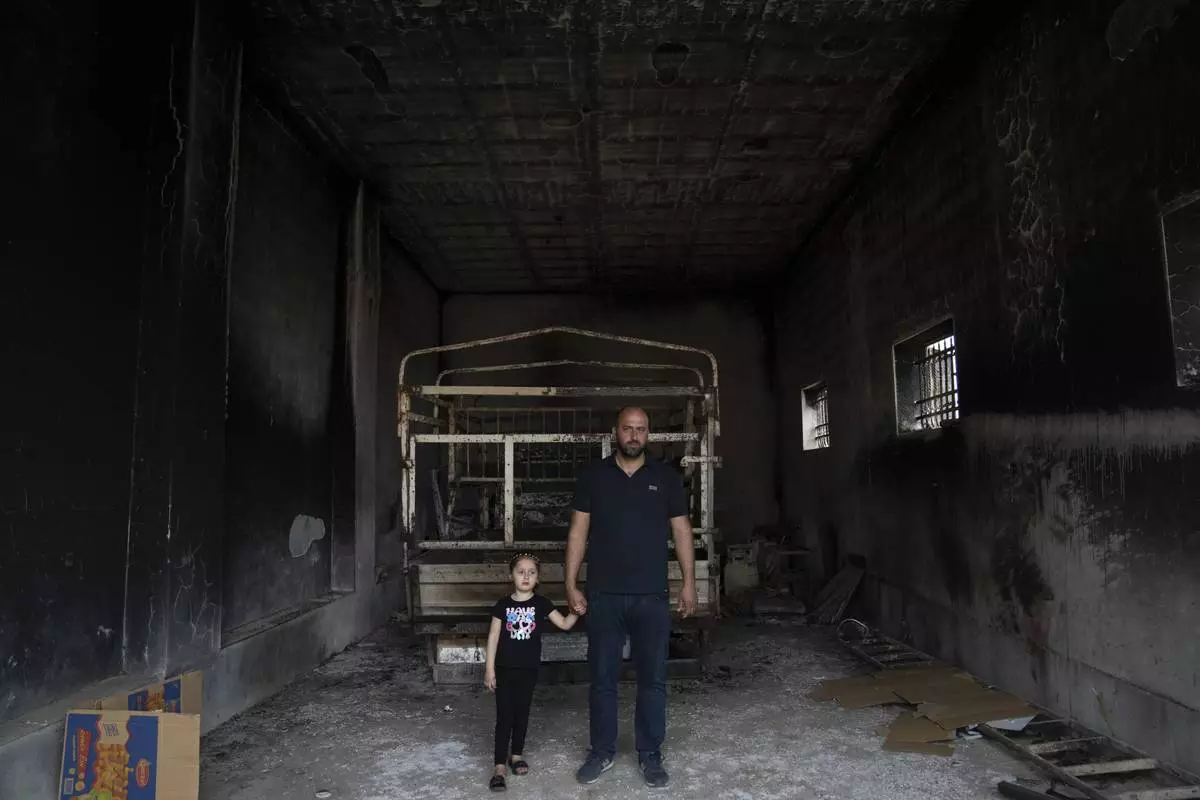
Ibrahim Dawabsha, 34, holds hands with his daughter Ghena, 3 while posing for a picture in front of his truck, at the garage of the family house, that was torched during an attack by Israel settlers last month, in the West Bank village of Duma, Tuesday, April 30, 2024. (AP Photo/Nasser Nasser)
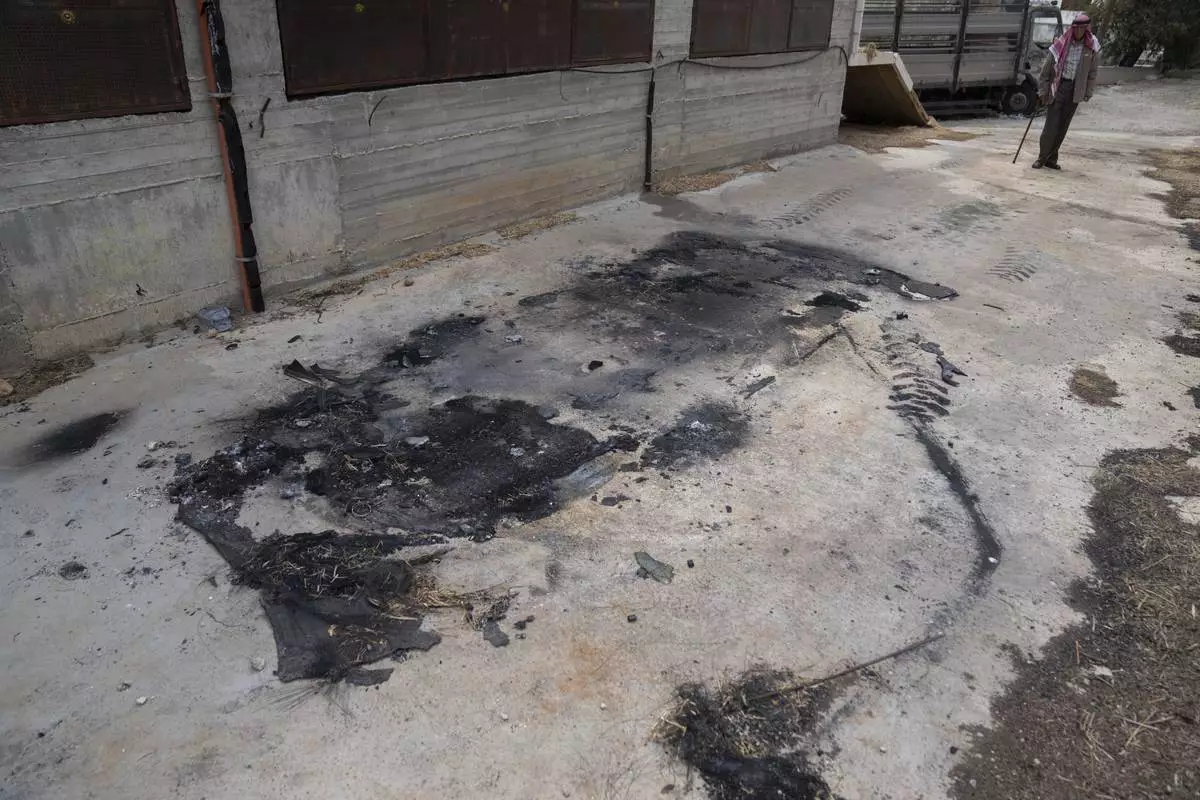
Fathi Dawabsha, 82, walks toward the remains of a family vehicle that was torched during an attack by Israel settlers last month, in the West Bank village of Duma, Tuesday, April 30, 2024. (AP Photo/Nasser Nasser)
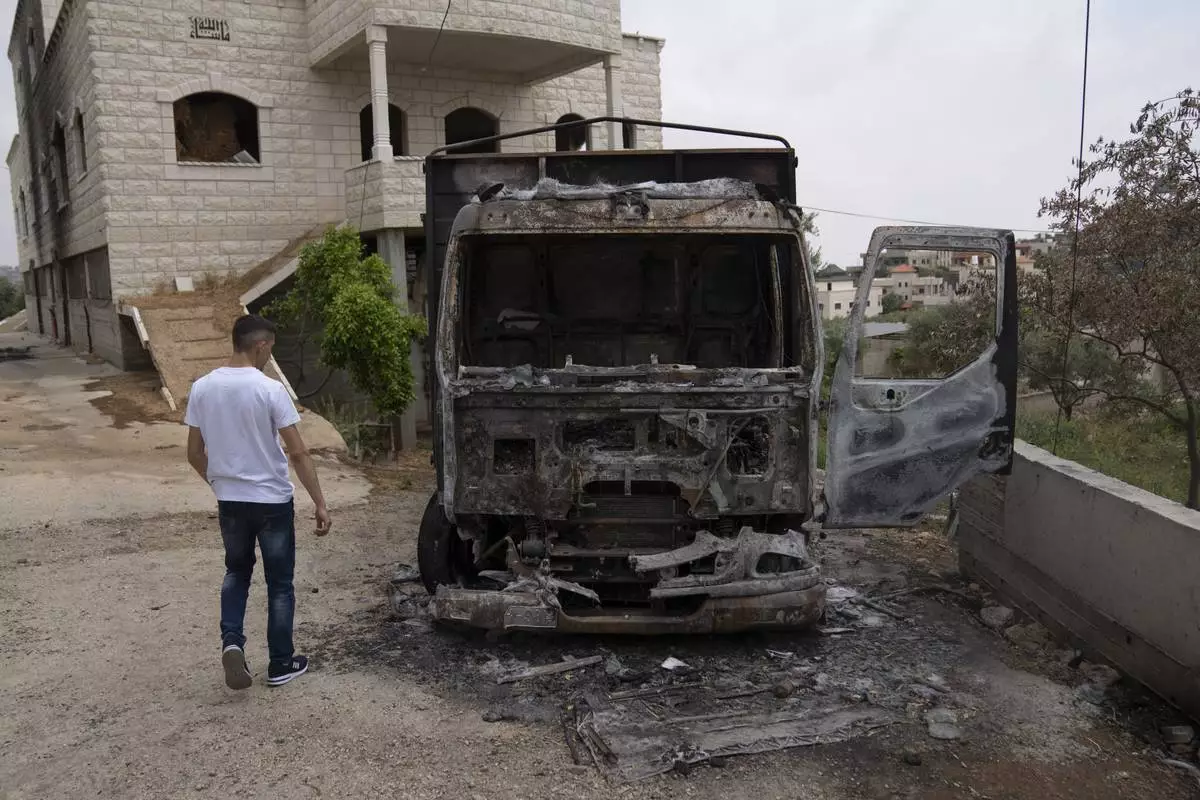
Fatahi Mohammad, 20, walks past his family's truck that was torched during an attack by Israel settlers last month, in the West Bank village of Duma, Tuesday, April 30, 2024. (AP Photo/Nasser Nasser)
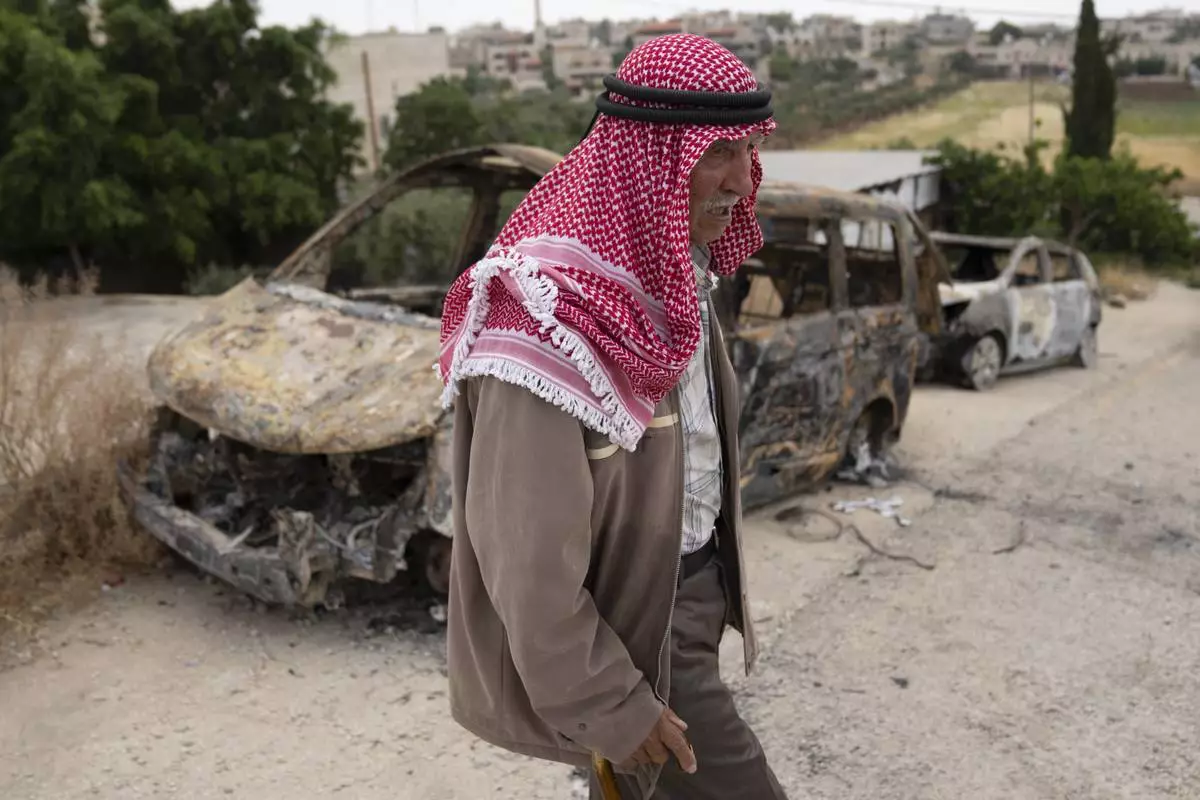
Fatahi Dawabsha, 82, walks past his family's vehicles that were torched during an attack by Israel settlers last month, in the West Bank village of Duma, Tuesday, April 30, 2024. (AP Photo/Nasser Nasser)
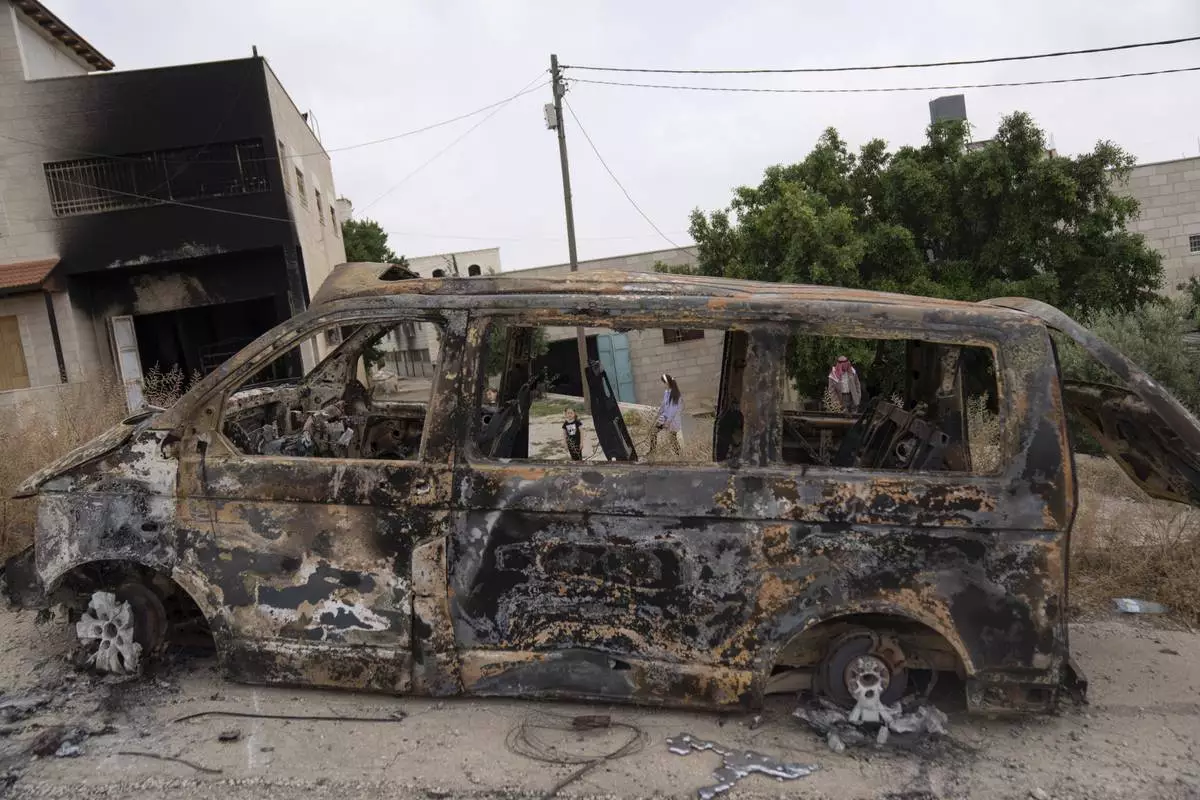
House and vehicles of Ibrahim Dawabsha and his family that were torched during an attack by Israel settlers last month, in the West Bank village of Duma, Tuesday, April 30, 2024. (AP Photo/Nasser Nasser)
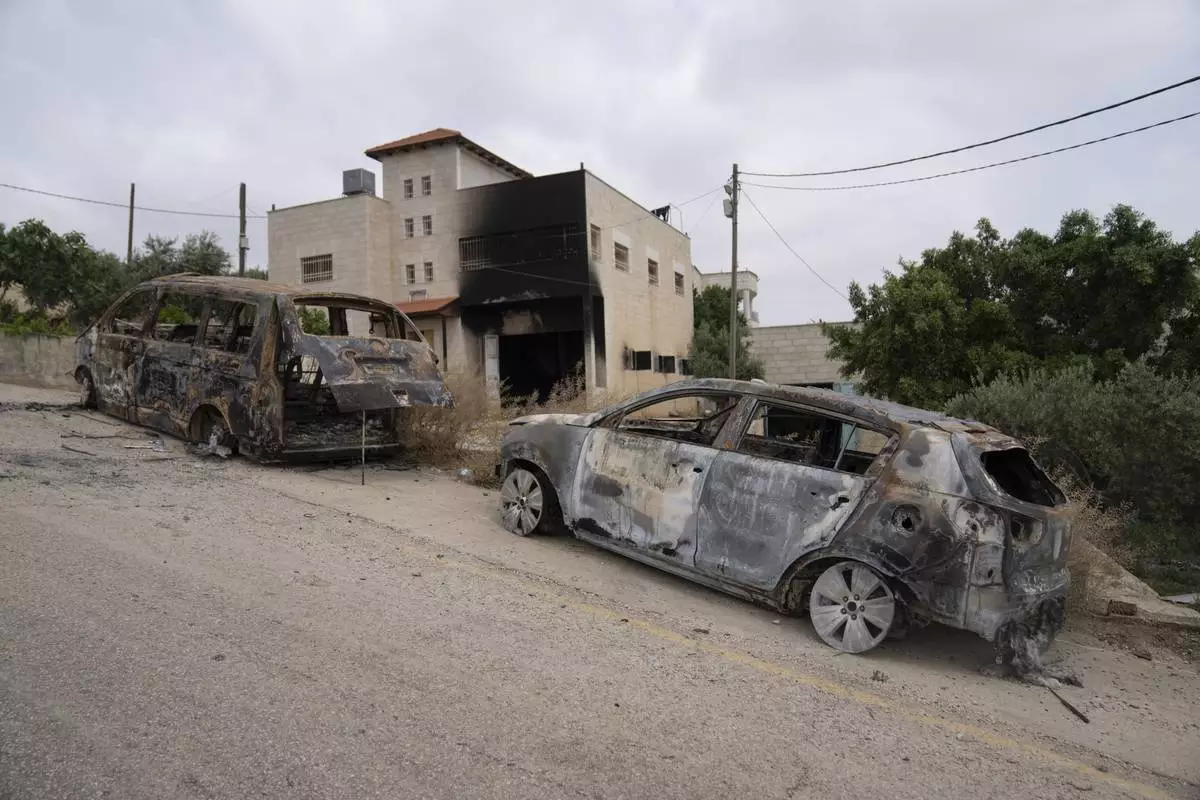
House and vehicles of Ibrahim Dawabsha and his family that were torched during an attack by Israel settlers last month, in the West Bank village of Duma, Tuesday, April 30, 2024. (AP Photo/Nasser Nasser)



























